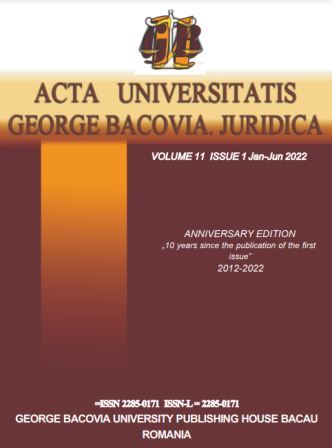Dreptul la vot al persoanelor condamnate în Europa. Examen de drept comparat
The right to vote of the convicted persons in Europe. Comparative law exam
Author(s): Florin ProcaSubject(s): Law, Constitution, Jurisprudence, Criminal Law, Human Rights and Humanitarian Law, EU-Legislation, Comparative Law
Published by: Editura Universităţii George Bacovia din Bacău România
Keywords: the right to vote; convicted persons; restriction; contestation; choice; rules;
Summary/Abstract: For any person, deprivation of liberty following a court-ordered conviction is an extreme situation, with a negative effect that has a lifelong effect, both during the separation from society and for a long period after release. During the time spent behind bars, the individual must adapt to certain rules imposed by the prison administration, be deprived of certain rights that he had as a free person and at the same time must know how to manage the inter-human relations that are established between persons deprived of their liberty. Relationships between inmates are based on frustrations, strong emotional feelings and are often driven by momentary interests that falsify the moral ambiance within the inmates group, all of which are difficult to manage without conflict, especially for a person who is on first contact with the prison environment. After reintegration into society, the prison past will be felt by the marginalization of the individual by most people in society. Although from the legal point of view, after the execution of the sentence, any person has equal rights with other citizens, in fact he can be judged from a moral point of view and will not have the same chances or possibilities as those who they did not interact with the criminal environment. For example, a former inmate is less likely to get a job interview; the chances of advancing in a possible job are significantly reduced, and so on. At the same time as receiving a custodial sentence, the person in question loses many of the rights that a normal member of society has, some less important but also some that are of interest to both him and third parties, such as the right tovote and be elected in a public office. Electoral rights, the right to vote and to be elected, are fundamental rights and can be exercised without restriction by adults with some exceptions related to mental alienation or interaction with the criminal environment. Deprivation of liberty always comes with the loss of the right to be elected to a public office during incarceration and sometimes the conviction of a custodial sentence has as an ancillary sanction the suspension of the right to vote. With the suspension of electoral rights, the individual becomes an element of society whose opinion no longer matters, an element lacking the power to influence the way the community will go and at the same time the individual will no longer be interested in the political factor because he will no longer participate to the electoral process. At the same time, the individual is deprived of the easiest way to say what he has to say, the easiest way to decide on the path that society wants to follow.
Journal: Acta Universitatis George Bacovia. Juridica
- Issue Year: XI/2022
- Issue No: 1
- Page Range: 253-272
- Page Count: 20
- Language: English, Romanian

